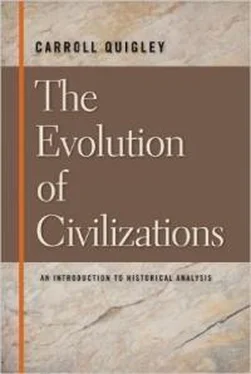Since then we in America have been denied the easy-out of charismatic leadership. It may just be that we shall have to follow the route that Quigley has marked out for us in this book. We may have to look at our history, analyze it, establish an identity in that analysis, and make another try at understanding reality in a fashion consistent with that open-ended tradition.
If so, America, acting for Western civilization, must find within the history of that civilization the intellectual and spiritual reserves to renew itself within the tradition. Striking as was the impact of this book at the time of its first publication, in 1961, its major impact will be in support of that effort in the future. There is hope that in Western civilization the future ideology will be rational. If so, it would be consistent with an epistemology that accepts the general validity of sensory experience and the possibility of making generalizations from that experience, subject to modification as additional facts are perceived. It is that epistemology which was termed moderate realism in the thirteenth century and, in its epistemologic aspects, is now known as the scientific method. Such a rational ideology is probable only if it is developed out of the special history of the West. As appreciation of that spreads, the kind of analysis that Carroll Quigley develops in this book is the analysis that the West must use.
Such as effort would be consistent in social terms with Quigley's view of his own life. He greatly admired his mother, a housewife, and his father, a Boston fire chief, and described them as teaching him to do his best at whatever he chose to put his energies. That was their way of saying what Carroll would have described as man's responsibility to understand and relate actively to a continually unfolding reality. He dedicated his life to that purpose.
Preface to the First Edition
This book is not a history. Rather it is an attempt to establish analytical tools that will assist the understanding of history. Most historians will regard such an effort as unnecessary or even impossible. Some answer must be made to these two objections.
Those who claim that no analytical tools are needed in order to write history are naive. To them the facts of history are relatively few and are simply arranged. The historian's task is merely to find these facts; their arrangement will be obvious. But it should require only a moment's thought to recognize that the facts of the past are infinite, and the possible arrangements of any selection from these facts are equally numerous. Since all the facts cannot be mobilized in any written history because of their great number, there must be some principle on which selection from these facts is based. Such a principle is a tool of historical analysis. Any sophisticated historian should be aware of the principles he uses and should be explicit to his readers about these. After all, any past event, even the writing of this book, is a fact of history, but most such facts, including this book, do not deserve to be mentioned in the narration of history.
If historians are not explicit, at least to themselves, about their principles of selection among the facts of the past and among the many possible arrangements of these facts, all histories will be simply accidental compilations that cannot be justified in any rational way. Historians will continue to write about some of the events of history while neglecting others equally significant or even more significant, and they will form patterns for these facts along lines determined by traditional (and basically accidental) lines or in reflection of old controversies about the patterns of these facts.
This, indeed, is pretty much what we have in history today. In American history, for example, dozens of books examine and reexamine the same old issues without, in most cases, contributing much that is new or different. The central fact of American history is the process by which a society with European cultural patterns was modified by the selective process of emigration from Europe and the opportunity to exploit the enormous, largely virgin, resources of the New World. Yet in most histories of the United States, this subject is hardly mentioned. Instead we have volume after volume of discussion on the rivalry of Jeffersonians and Hamiltonians or on the unrealistic problem whether the American Civil War was a repressible or an irrepressible conflict or on whether the American lapse into isolationism after World War I was caused more by the vindictiveness of Lodge or the inflexibility of Wilson.
To the non-American world, the central fact of American history is American technology—what they used to call "Fordism," meaning mass production. Until very recently there was no history of American technology in existence, and even today this vital subject obtains only incidental mention, with an almost total lack of real understanding, in most histories of the United States.
As we have said, the content of most books depends upon accidental factors or, at most, on the rehash of ancient controversies. The Civil War has commanded major attention, but there is little recognition of the real significance of this war; namely, that after giving an impetus to industrialization, it left a residue of emotional patterns that alienated the farmers of the South and the farmers of the West so that the country could be dominated politically by the high finance and heavy industry of the East. This situation, which forms the essential background for such familiar phenomena as the agrarian discontent and third-party movements of the period 1873-1933, as well as the attacks on political machines and the rise of civil service, or the growth of muckraking or progressivism, and of government regulation of business, is rarely presented in adequate fashion as the background that it is. Instead these events are mentioned as if they were merely accidental occurrences related in some obscure fashion to the idiosyncrasies of Americans. And the average college student of American history finishes his study without any idea why the Republican party became the party of big business in 1892-1932, what the Whitneys contributed to American life, or the significant contributions of Joseph Henry or Josiah Willard Gibbs (1839-1903) to the world today.
In the incredible and growing excitement over the Civil War, tradition and stale controversy continue to determine the centers of attention. The Battle of Gettysburg has been fought and refought (with four major books in the last six months), just as if the South ever really had a chance of winning the war, in this or any other battle, while the Battle of Petersburg, which is of far greater tactical significance (since it was a direct foretaste of 1914-18), is almost totally neglected.
Matters are no better in European history. To mention only one point, in which I am personally very interested, the one dominant central fact of European history over the last thousand years has been the almost steady growth of public authority and the public services. We could never guess this from the history books. Or again, reams have been written on the French Revolution and its origins, yet some of the most vital points are hardly mentioned. We have been told repeatedly that the government of the Old Regime was "absolute" and that the Revolution began because this regime was financially "bankrupt." Few have seen the paradox lying in a situation where an "absolute state" could not tax its subjects. A colleague on the faculty at Princeton once stated in conversation as a fact that the Revolution occurred in France because that country was the most advanced in Europe. When I replied that, in my opinion, the Revolution came in France because the French government was one of the most backward in Europe, he was astonished. I am not trying here to consider this problem; I am simply trying to point out that this is a problem that certainly should have been examined in connection with the study of the French Revolution and that just as surely would have been discussed in any historical work based on rational tools of historical analysis. Because such tools have not been used, study of the French Revolution, like the study of other matters, has concentrated its attention on those aspects of the problem that came to be discussed largely for traditional and accidental reasons. In fact, the chief force directing the historiography of the French Revolution has not been a determined effort to find what happened but rather has been the party conflicts of the Third French Republic. Once these partisan motivations are rejected, a history of the French Revolution could be written that, with equal justification, would have discussed quite different aspects of the subject. Without principles of selection among the facts and theories, one selection is as well justified as another on any grounds outside tradition.
Читать дальше










